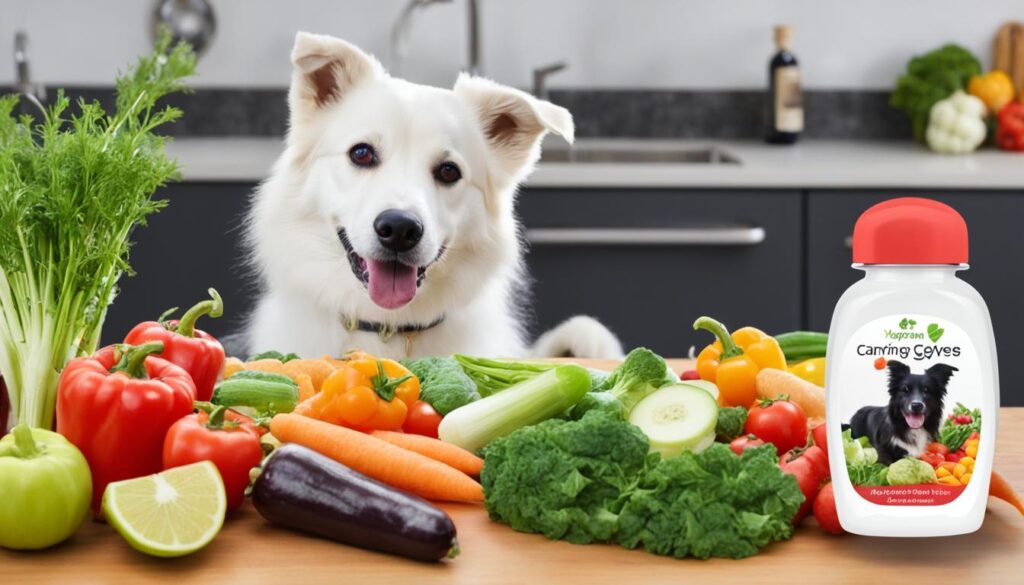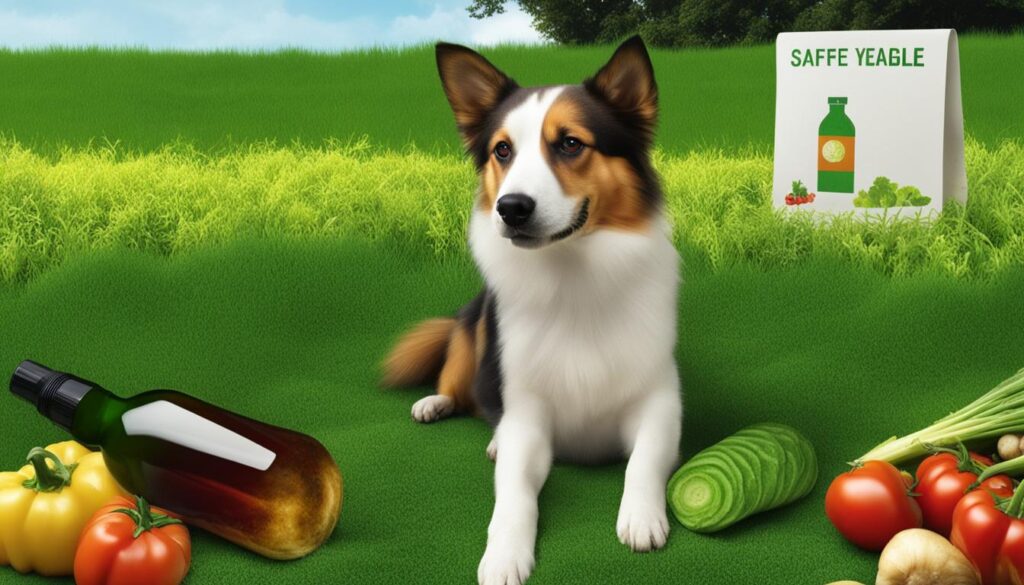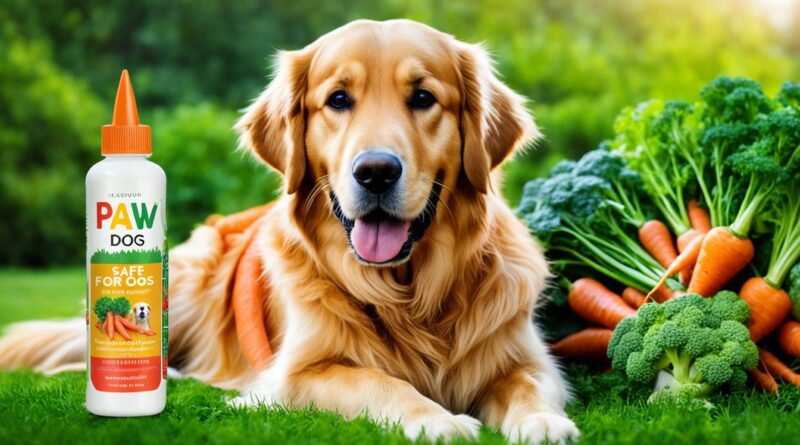Is Vegetable Glycerin Safe for Dogs? Vet Insights
Vegetable glycerin is a commonly used ingredient in pet products, ranging from treats to shampoos. As a dog owner, you may be wondering if vegetable glycerin is safe for your furry friend. While it has been deemed safe for dogs by authorities such as the European Food Safety Authority and the U.S. Food and Drug Administration, there are certain considerations to keep in mind.
While vegetable glycerin is generally safe, it does have a high sugar content, which can be a concern for dogs with certain health conditions, such as diabetes or obesity. Additionally, some dogs may experience side effects when consuming glycerin, including headaches, vomiting, excessive thirst, and diarrhea. It is crucial to use vegetable glycerin in moderation and under the guidance of a veterinarian. They can provide valuable insights tailored to your dog’s specific needs and help determine the appropriate dosage.
Furthermore, it is essential to consider alternative options for your dog’s dietary and skincare needs. There are various natural remedies available that can provide similar benefits to vegetable glycerin without the potential risks. Consulting with a veterinarian can help you explore these alternatives and make an informed decision that aligns with your dog’s well-being.
Key Takeaways
- Vegetable glycerin is commonly used in pet products, but it has a high sugar content that may be concerning for dogs with certain health conditions.
- Some dogs may experience side effects when consuming glycerin, including headaches, vomiting, excessive thirst, and diarrhea.
- Consulting with a veterinarian is crucial before incorporating vegetable glycerin into your dog’s diet or skincare routine.
- Exploring alternative options for your dog’s dietary and skincare needs is recommended to ensure their well-being.
- Monitoring your dog for any signs of adverse reactions and discontinuing use if any issues arise is important.
What is Glycerin?
Glycerin, also known as glycerol, is a colorless, odorless liquid commonly used in pharmaceutical products, toothpaste, and pet foods. It serves various purposes and offers benefits in different applications, making it a versatile ingredient. Let’s take a closer look at what glycerin is used for and its impact on dogs.
Glycerin in Dog Food and Treats
Glycerin plays a significant role in the pet food industry, particularly in dog food and treats. It is used to enhance the taste and palatability of these products, making them more appealing to your furry friend. Additionally, glycerin helps keep dog food and treats dry, preventing mold growth and extending their shelf life.
One of the main concerns pet owners have when it comes to glycerin is its high sugar content. While vegetable glycerin, a common type of glycerin used in pet products, is generally considered safe for dogs, some owners worry about the potential negative effects of excessive sugar consumption on their pets’ health. However, it’s important to note that dogs’ bodies process sugars differently from humans, and moderate amounts of glycerin are typically well-tolerated.
Glycerin’s Impact on Dogs
Is glycerin safe for dogs? While it is generally considered safe, there are specific considerations to keep in mind.
Firstly, glycerin is not known to be toxic to dogs and typically will not cause any harm if ingested in small amounts. However, excessive consumption of glycerin can potentially lead to gastrointestinal upset, such as diarrhea or vomiting. It’s important to monitor your dog’s intake and ensure they are not consuming excessive amounts of glycerin.
Another concern some pet owners may have is whether glycerin can harm dogs’ eyes. Glycerin itself is not known to cause harm to dogs’ eyes, but it’s essential to be cautious when using any product near their eyes. If you plan to use glycerin for eye care purposes, such as in artificial tears to treat dry eyes, consult your veterinarian for guidance and appropriate usage instructions.
Additionally, some pet owners may choose to opt for coconut glycerin as a safe alternative. Coconut glycerin is recognized as safe for both humans and dogs and does not impact blood sugar levels. If you have concerns about the sugar content in traditional vegetable glycerin, coconut glycerin may be a suitable option to consider.

Summary
Glycerin, also known as glycerol, is a versatile liquid used in various applications, including pet products, pharmaceuticals, and toothpaste. In the pet food industry, glycerin enhances taste and texture, and it is considered safe for dogs when consumed in moderation. While some pet owners have concerns about its high sugar content, coconut glycerin can offer an alternative with no impact on blood sugar levels. However, it’s always best to consult with a veterinarian before incorporating any new products into your dog’s routine. Remember to monitor your dog’s intake and discontinue use if any adverse reactions occur.
Vegetable Glycerin in Dog Food and Treats
When it comes to dog food and treats, vegetable glycerin is a commonly used ingredient. However, there are concerns among pet owners about its safety for dogs. While it has not been thoroughly studied, some worry about the high sugar content of glycerin and its potential effects on their furry friends’ health.
It’s important to note that vegetable glycerin is generally recognized as safe for dogs. Authorities such as the European Food Safety Authority and the U.S. Food and Drug Administration have deemed it safe for consumption. However, the lack of extensive research on dogs specifically has left pet owners with lingering questions and apprehensions.
One of the primary concerns about glycerin in dog food and treats is its impact on the overall health of dogs. While it may provide moisture and act as a binding agent, the high sugar content has raised concerns about potential side effects such as obesity, dental issues, and diabetes in dogs.
Additionally, some pet owners worry about the potential risks associated with glycerin suppositories. Dogs may accidentally ingest a glycerin suppository, leading to concerns about its safety and potential harm. While there is limited information on this specific scenario, consulting with a veterinarian is crucial if such an incident occurs.
Pet Owners’ Concerns and Vegetable Glycerin Alternatives
Pet owners want to ensure that the food and treats they provide for their dogs are safe and promote their overall well-being. Consequently, some are exploring alternative options that do not include glycerin. This allows pet owners to steer clear of any potential risks associated with glycerin while still providing their dogs with nutritious and delicious treats.
There are various vegetable glycerin alternatives available for dogs, ensuring pet owners have a wide range of choices. Natural products such as sweet potatoes, coconut oil, and pumpkin can be healthy and safe alternatives to glycerin, offering similar benefits without concerns about high sugar content or potential side effects.
Moreover, it’s important to consider that glycerin isn’t only used in dog food and treats. It is also a common ingredient in skincare products for dogs, such as shampoos, where its moisturizing and calming properties can benefit their skin. However, just as with dietary glycerin, it is advisable to consult with a veterinarian before using glycerin or any other product on your dog’s skin.
While vegetable glycerin continues to be utilized in commercial dog food and treats, it’s vital for pet owners to stay informed and address their concerns. Exploring alternative options and consulting with a veterinarian can help ensure that your dog’s diet and skincare routine are tailored to their specific needs, promoting their well-being and providing you with peace of mind.

Benefits of Vegetable Glycerin for Dogs
Vegetable glycerin offers numerous potential benefits for the health and well-being of dogs. When used appropriately, glycerin can contribute to various aspects of a dog’s overall wellness. Let’s explore some of the key advantages:
Improves Heart Health
Recent studies suggest that vegetable glycerin can positively impact heart health in dogs. It has been found to improve cardiac metabolism and energy balance, promoting a healthy cardiovascular system. By incorporating glycerin into your dog’s diet, you can help enhance their heart function and overall cardiovascular well-being.
Helps Maintain Paw Health
Many dog owners worry about the condition of their furry friend’s paws, especially regarding dryness, cracking, and irritations. Vegetable glycerin can be a valuable aid in maintaining the health of your dog’s paws. It acts as a natural moisturizer, keeping their paws hydrated, smooth, and free from peeling or discomfort.
Hydration and Endurance Benefits
Glycerin has been shown to improve hydration and endurance in dogs. This is particularly valuable for active dogs or athletes, as it can help them maintain optimal performance levels during physical activities. By incorporating glycerin into their routine, you can support your dog’s hydration needs and enhance their endurance.
Brain Blood Flow Enhancement
Studies have indicated that vegetable glycerin may have a positive impact on brain blood flow in dogs. By improving blood circulation to the brain, glycerin can enhance brain function and support cognitive health in dogs. This is particularly relevant for aging dogs or those with cognitive impairments.
Reduces Eye Disease Risk
Glycerin’s properties may contribute to reducing the risk of eye diseases, such as glaucoma, in dogs. Its ability to improve blood flow and provide moisture can help maintain the health of your dog’s eyes. Regular use of glycerin in eye care can be an effective preventive measure for common eye ailments.
“Vegetable glycerin has several potential benefits for dogs, including improved heart health, maintained paw health, enhanced hydration and endurance, enhanced brain blood flow, and reduced risk of eye diseases.” – Veterinary Expert
When incorporating vegetable glycerin into your dog’s routine, it’s important to do so under the guidance of a veterinarian. They can provide you with dosage recommendations and help ensure your dog’s overall well-being. Now that we’ve explored the benefits of vegetable glycerin, let’s move on to discuss the use of witch hazel on dogs.

Using Witch Hazel on Dogs
Witch hazel, a natural astringent, has long been used as a topical treatment for various skin conditions in both humans and dogs. It offers a range of benefits and is commonly recommended by holistic veterinarians for various purposes.
Benefits of Witch Hazel for Dogs
When used properly, witch hazel can provide several advantages for your furry friend:
- Reduces inflammation: Witch hazel has anti-inflammatory properties that can help reduce swelling and ease discomfort caused by skin irritations, insect bites, and minor injuries.
- Soothes itching: If your dog experiences itchy skin, witch hazel can provide relief by soothing itchiness and minimizing the urge to scratch.
- Treats skin irritations: Witch hazel can be applied to minor skin irritations, such as hot spots or rashes, to help alleviate symptoms and promote healing.
- Helps with ear cleaning: Some veterinarians recommend using witch hazel as an ear cleanser for dogs, helping to remove excess wax and debris while maintaining ear hygiene.
It is important to note that witch hazel should be used specifically formulated for animals or a vegetable glycerin-based product to ensure safety and effectiveness. Applying witch hazel sparingly is crucial to prevent excessive drying or irritation.
Risks of Witch Hazel for Dogs
While witch hazel is generally safe for topical use on dogs, there are a few risks to consider:
- Dehydration of dry skin: Witch hazel may further dehydrate already dry skin conditions. It is important to avoid using witch hazel on dogs with dry skin issues to prevent exacerbating the problem.
- Potential adverse reactions: Every dog is unique, and some dogs may have sensitivities or allergies to witch hazel. It’s essential to monitor your dog closely for any signs of irritation or adverse reactions after applying witch hazel.
By using witch hazel with caution and awareness, you can safely harness its benefits to support your dog’s skin health.
Risks of Witch Hazel for Dogs
While witch hazel is generally safe to use topically on dogs, there are some risks to be aware of. It is not recommended for use on dry skin conditions as it can exacerbate the problem. High doses of witch hazel can potentially cause kidney or liver damage, although this is more applicable to internal use.
If a dog accidentally ingests witch hazel, it can lead to hypersalivation, vomiting, diarrhea, and skin redness or burns. It is important to use witch hazel sparingly and to choose a product with safe ingredients, such as vegetable glycerin, to minimize any potential risks.
Taking precautions with witch hazel:
- Do not use witch hazel on dry skin conditions
- Use witch hazel sparingly
- Choose a product with safe ingredients, such as vegetable glycerin
- Monitor your dog for any signs of adverse reactions
“It is not recommended for use on dry skin conditions as it can exacerbate the problem.”
To ensure the safety of your furry companion, it is always best to consult with your veterinarian before using witch hazel or any other topical treatment on your dog. They can provide personalized advice based on your dog’s specific health needs and help you make informed decisions regarding their skincare.
Conclusion
The safety of vegetable glycerin and witch hazel for dogs is still a topic of debate and research. While they have been deemed safe by authorities and some veterinarians use them in their practice, it is important to use them in moderation and consult with a veterinarian before incorporating them into your dog’s diet or skincare routine.
It is also recommended to explore alternative options and healthier alternatives for dog food and treats until more research is conducted. The high sugar content of vegetable glycerin raises concerns about its potential negative effects on health. Therefore, it is advisable to consider nutritious and natural alternatives to provide optimal nutrition for your furry friend.
Always monitor your dog for any signs of adverse reactions when using vegetable glycerin or witch hazel. If any issues arise, discontinue their use immediately and seek veterinary advice. Your veterinarian will be able to provide guidance specific to your dog’s needs and recommend safer alternatives if necessary.
Remember, the well-being of your dog should always be your top priority. By staying informed, consulting with professionals, and making mindful choices, you can ensure the health and happiness of your beloved pet.
FAQ
Is vegetable glycerin safe for dogs?
Vegetable glycerin is generally considered safe for dogs. However, it is important to use it in moderation and consult with a veterinarian before incorporating it into your dog’s diet.
What is glycerin?
Glycerin, also known as glycerol, is a colorless, odorless liquid commonly used in pharmaceutical products, toothpaste, and pet foods.
Is vegetable glycerin safe for dogs’ skin?
Vegetable glycerin can be used in skin care products for dogs, such as shampoos, to keep their skin moisturized and calm. However, it is important to consult with a veterinarian before using glycerin or any other product on your dog’s skin.
What happens if a dog eats a glycerin suppository?
It is not recommended for dogs to ingest glycerin suppositories. If your dog accidentally ingests a glycerin suppository, it is important to contact your veterinarian for guidance.
What are the benefits of vegetable glycerin for dogs?
Vegetable glycerin has several potential benefits for dogs, including improving heart health, maintaining paw health, improving hydration and endurance, and reducing the risk of eye diseases.
Can I put glycerin on my dog’s paws?
Glycerin can be used on your dog’s paws to keep them moisturized and prevent peeling and irritation. However, it is important to consult with a veterinarian before using glycerin or any other product on your dog’s paws.
What are the risks of witch hazel for dogs?
While witch hazel is generally safe to use topically on dogs, it is not recommended for use on dry skin conditions as it can further dehydrate the skin. High doses of witch hazel can potentially cause kidney or liver damage, although this is more applicable to internal use.

